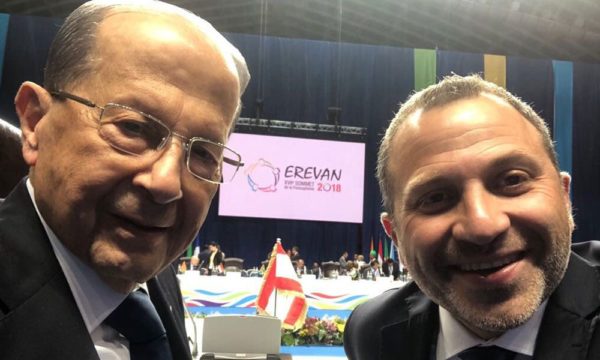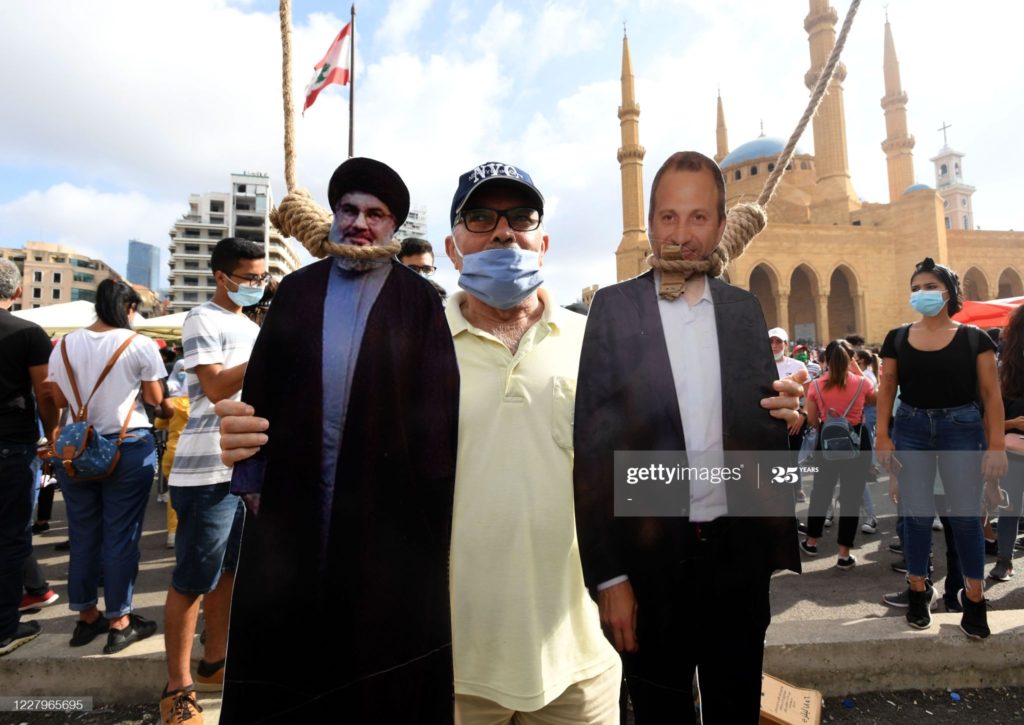Everything Gebran Bassil gained was gifted to him by his father-in-law, the country’s president. On his own, he is a mediocrity who seems good only at making enemies.

By; Michael Young
Lebanon’s President Michel Aoun’s efforts to salvage what remains of his calamitous mandate are having less and less of an impact on the political situation in Lebanon. Mr Aoun’s failed call for a national dialogue in the past two weeks was the latest indication that his political rivals are seeking to run the clock out on his presidency. Mr Aoun’s term will end later this year, while parliamentary elections are scheduled for May.
Since his return to Lebanon in 2005 from France, where he lived in exile for 14 years, Mr Aoun, aided by his son-in-law Gebran Bassil, has been a destabilising force in post-war Lebanese politics, at least for the politicians who had ruled the country until then. This is not to suggest that Mr Aoun was better than his rivals – he and Mr Bassil’s greatest ambition was to become part of the cartel in power, even as they claimed to stand against its pervasive corruption.
Few took their anti-corruption line seriously, as Mr Bassil is regarded by many Lebanese as being at the centre of illicit activities. However, Mr Aoun’s and Mr Bassil’s alliance with Hezbollah gave them leverage, and in 2016, the party’s support for Mr Aoun’s presidential bid was the primary factor leading to his election, after a two-year political vacuum it had imposed to force all major parties to back him.
Once in office, Mr Aoun failed to become a unifier. On the contrary, he gave Mr Bassil latitude to engage in lucrative patronage activities and impose his preferences on the political class. This soon alienated the then prime minister, Saad Hariri, as well as the parliament speaker, Nabih Berri, leaving Mr Aoun and Mr Bassil relatively isolated, though they still enjoyed Hezbollah’s backing.
In the past two years, the president and his son-in-law have shifted direction, seeking to ensure that Mr Bassil would succeed Mr Aoun in office. Mr Bassil installed himself at the presidential palace, and many observers believe he is the person really running the show there, with the approval of the elderly and frail Mr Aoun.
However, after October 2019, when the Lebanese people rose up against their political leadership in nationwide protests, Mr Bassil’s star had already been waning. He was the person most loudly insulted by demonstrators at the time, and in November 2020 the US sanctioned Mr Bassil, accusing him of being at the forefront of corruption. This severely damaged his presidential prospects.
Since then, Lebanon’s economic collapse has turned many people against Mr Aoun, who is seen as an ineffectual leader focused on advancing Mr Bassil’s agenda. As head of state, he has attracted the most public opprobrium, even if he is no more responsible than are the other politicians, who have collectively plundered Lebanon.
But that has not put an end to Mr Bassil’s ambitions. He is still manoeuvring to maximise his presidential chances by trying to lead his party, the Free Patriotic Movement (FPM), to victory in the parliamentary elections. First, though, Mr Aoun has to show the Lebanese people that his term in office is not the fiasco many of them believe it is. His call for a national dialogue was supposed to be one of the steps to persuade the public of this.
Almost immediately, however, most key political figures declined to attend. This included Mr Hariri, the Druze leader Walid Jumblatt, the Maronite Christian politician Suleiman Franjieh, a leading contender for the presidency, and the Lebanese Forces, the FPM’s major rival in Christian-majority areas. Only Hezbollah accepted the invitation, while Mr Berri, a political enemy of Mr Bassil, said he would participate, but seemed to have little confidence in a positive outcome.
It was apparent that none of Mr Aoun’s adversaries was willing to give him a political success that he could use in the parliamentary elections against them and their allies. Nor was the arch-divider going to persuade anybody that he had been transformed into someone who could bring Lebanon’s political forces together. After six years of running roughshod over the implicit rules of Lebanon’s sectarian political game, Mr Aoun and Mr Bassil appeared to be on their own.

This raises an important question for Mr Bassil. Assuming that Hezbollah does not support him for the presidency when Mr Aoun’s term ends, what is his political future? Everything Mr Bassil gained was gifted to him by his father-in-law. On his own, he is a mediocrity who seems good only at making enemies.
Whatever its shortcomings, the FPM stood for something when Mr Aoun was still in exile. It was a party that sought to defend Lebanon’s sovereignty; it represented a counterweight to the corrupt political class; and to many Christians it was an alternative to the Lebanese Forces, once a wartime militia that many of Mr Aoun’s partisans regarded as an obstacle to Mr Aoun’s efforts to revive the state.
Yet when Mr Aoun allied himself with Hezbollah, he undermined the first principle, given the party’s systematic violation of Lebanese sovereignty. Mr Bassil’s control of lucrative ministries showed he was no different than the venal politicians derided by his father-in-law. And Mr Aoun’s willingness to cover for Hezbollah’s weapons showed he was willing to compromise on state authority, in favour of a militia that works largely outside the state.
Mr Aoun is on his way out, and his failed invitation to a national dialogue shows the man’s measure. For many of his countrymen, the sooner the president leaves, the better. His mandate has become an incarnation of the nation’s ruin.
originally published by
THE NATIOMNAL NEWS.COM

Leave a Reply
You must be logged in to post a comment.